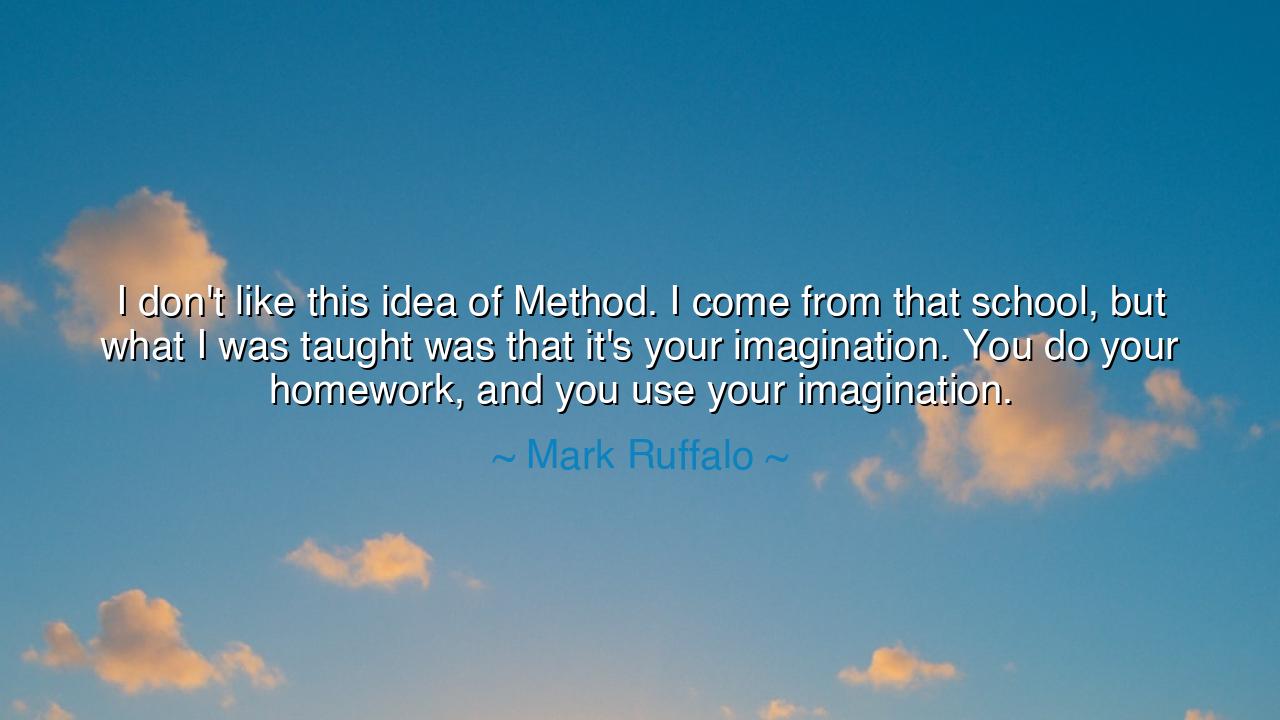
I don't like this idea of Method. I come from that school, but
I don't like this idea of Method. I come from that school, but what I was taught was that it's your imagination. You do your homework, and you use your imagination.






“I don’t like this idea of Method. I come from that school, but what I was taught was that it’s your imagination. You do your homework, and you use your imagination.” Thus spoke Mark Ruffalo, a man of art and empathy, whose craft is not built upon the tyranny of technique, but upon the living flame of imagination. In these words lies a quiet rebellion — a call back to the heart of creation itself. He speaks not as one who scorns discipline, but as one who has discovered that all discipline must bow before the divine freedom of the mind. For the truest art, Ruffalo reminds us, is not the imitation of life, but the re-imagining of it.
The Method, as he speaks of it, was born of good intention — to make the actor feel truth, to live truth, to breathe as the character breathes. But Ruffalo, in his wisdom, reveals a danger hidden in such devotion: that one may lose the joy of creation and become enslaved to the mechanics of it. The ancients would have understood him well. For even in the temples of old, the sculptor did not become the god he carved — he only allowed the imagination to flow through his hands as divine fire, shaping the marble into glory. The artist’s power, then as now, lies not in suffering, but in vision.
When Ruffalo says, “You do your homework, and you use your imagination,” he speaks to the sacred balance between knowledge and inspiration. The homework — the study, the preparation, the discipline — is the root; but the imagination is the blossom. Without the root, the flower withers; without the flower, the root bears no beauty. One must labor, yes — to know the craft, to understand the world, to observe life with careful eyes. Yet when the moment of creation comes, one must cast away fear and surrender to the living pulse of the imagination, where art breathes and truth becomes radiant.
Consider the story of Michelangelo, the sculptor who gazed upon a block of stone and said, “I saw the angel in the marble, and I carved until I set him free.” He did his homework — he studied anatomy, geometry, and scripture; he honed his hand through endless toil. But it was his imagination that gave life to David’s gaze, that infused the cold marble with divine vitality. Had he been only a craftsman, he would have carved a statue; but because he was a dreamer, he summoned a soul. Such is the meaning of Ruffalo’s teaching: that art is not bondage to method, but communion with the unseen.
Even in the realm of acting, this truth endures. Ruffalo’s performances, from the tender to the heroic, are marked not by artifice but by authenticity. He does not disappear into the role; he illuminates it with his inner life. His imagination allows him to feel what cannot be rehearsed — the ache of loss, the spark of courage, the tremor of love. In this way, he reminds us that the artist’s greatest instrument is not their body, nor even their mind, but their soul, made alive through wonder.
Yet this teaching extends beyond art, reaching into the realm of life itself. Each of us, whether painter or worker, teacher or wanderer, must find the same balance: to do our homework, to prepare ourselves with diligence and wisdom, and then to use our imagination to breathe life into what we do. Without preparation, our dreams collapse; without imagination, our labor becomes mechanical. The wise live as artists of existence — building with structure, yet painting with light.
The lesson, therefore, is this: do not become a slave to method. Let knowledge be your servant, not your master. Learn, practice, prepare — but when the hour of creation arrives, release yourself into the mystery. Trust the imagination, for it is the breath of the divine within you, the voice that turns skill into magic and effort into art.
So, as you go forth in your craft or in your living, remember the teaching of Mark Ruffalo: Do your homework, and use your imagination. Study as though you are mortal; create as though you are eternal. For the method is the road, but imagination is the journey’s flame — and it is that flame which lights the world anew.






AAdministratorAdministrator
Welcome, honored guests. Please leave a comment, we will respond soon